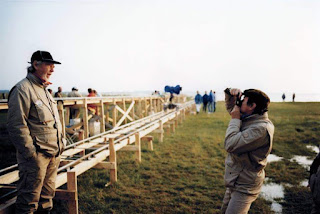Wings of Desire (1987, Wim Wenders)
Wim Wenders has a knack for road movies. His films always have a sense of solitude lingering throughout yet it's life-affirming, full of minute moments of serenity amidst the bitterness and lonesomeness. Wings of Desire is no different, another one of those voyages that capture Berlin in its most sophisticated self, a city where people are thronged on the surface but desolate inside.
Set in the backdrop of the fall of the Berlin Wall, Wenders chronicles his film around two enigmatic angels in a phantasmagoric landscape, both of whom cruise around the city eavesdropping on the intimate and profound desires and notions of people.
Above everything, Wings of Desire is a celebration of the mundanity of life and the amusement, cacophonies and despair that comes with it. There's a constant buzz prevailing around to depict that the city is jammed and shrouded but the persistent voiceovers reminisce lonesome souls.
Wings of Desire has to be one of the most quotable films ever made. There's too much philosophical stuff cramped together, though in a good way which elicits epiphanies every now and then be it the love affair, Homer references, or aged people strolling unable to locate the place they once knew.
Wim's camera hovers above a Berlin marred by horrendous past events juggling between monochrome and lifelike colours as well as few archival footages tracking down the tumultuous times. At times the film is thoroughly clamorous; there's the abundant use of frames within frames, sounds overlapping one another, all culminating in a contemplative mood piece.
In proliferation to all its charismatic, thought-provoking philosophical voiceover and hypnotic imagery, Wim Wenders film reminds us how beautiful it is to be a human.
Just as the credit sequence illustrates, Wings of Desire is a perfect tribute to three of Wim''s cinematic angels: Ozu, Truffaut and Tarkovsky.






Comments
Post a Comment